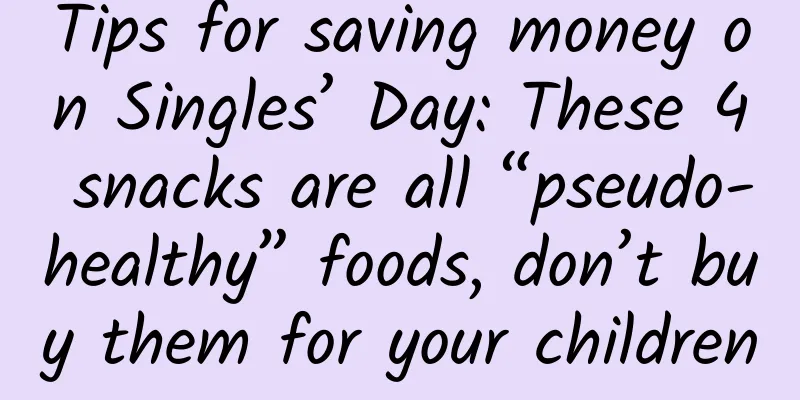Tips for saving money on Singles’ Day: These 4 snacks are all “pseudo-healthy” foods, don’t buy them for your children

|
Double Eleven Shopping I have saved a lot of coupons Buy it for yourself if you don't have children Buy it for your children if you have them Although the prelude to Double Eleven has passed with great fanfare, the real day has not yet arrived. I believe many people are waiting for the big move. They have saved up a lot of coupons, just waiting for the time to come, to make a big move! Those who don’t have children buy it for themselves, and those who have children buy it for their children. Most parents’ shopping carts are filled with “good things” prepared for their children! However, the bigger the promotion, the higher the risk of paying the IQ tax! Let’s take a look at the four “pseudo-healthy” foods that experts have weeded out. It’s not too late to remove them from your shopping cart! 01 Yogurt: One bottle equals four sugar cubes Mom: "Do well in the exam. If you get first place, I'll buy you a box of yogurt as a reward!" Child: "Thank you, Mom, you are so kind!" Most parents think that drinks such as yogurt are very healthy. After all, they have the word "milk" in their name, and milk is nutritious, so it's not much different, and it's equivalent to providing calcium supplements for children. In fact, yogurt is a "pseudo-healthy" food. Drinking a box of yogurt is equivalent to giving children 16g of sugar, which is about 4 sugar cubes. I believe no parent would agree to let their children eat 4 sugar cubes at a time. Image source: e-commerce platform Image source: e-commerce platform According to national requirements, the order of ingredients must be written from most to least [1]. The first ingredient in this yogurt is water, not milk, and fructose syrup and white sugar are also added. The Dietary Guidelines for Chinese Residents recommends that daily intake of added sugars should be below 25g[2]. If children are given yogurt as a reward, they will easily finish one or two boxes, and their sugar intake will easily exceed the standard. Excessive intake of added sugar by minors can cause many direct and indirect harms to their physical and mental health: 1. Increase the risk of dental caries; 2. Not only is it high in calories, it also stimulates appetite, causing you to eat more and induce obesity; 3. Causes blood sugar to rise and increases the risk of diabetes; 4. People who often drink sweet drinks will refuse to drink plain water; 5. Prefer sweet snacks, which affects the eating of regular meals and leads to malnutrition. This breast is not that breast. For the sake of your child's health, it is better to touch it as little as possible. 02 Plums: Eating one bag of plums will result in 9.5g of salt intake Many parents believe that candied dried fruits are made from natural fruits, have a sweet and sour taste, and can provide children with some nutrition. However, a lot of sugar and salt are added to this type of food during the processing. Because the sweet and sour taste is more prominent, you can't taste the obvious saltiness, but the salt content is really not low. The following figure shows the ingredient list and nutritional composition table of a certain brand of preserved plums: Image source: e-commerce platform From the ingredient list, we can see that table salt is located just behind the fruit itself and white sugar, which shows that a lot of salt is added. Image source: e-commerce platform 1g of salt is equal to 400mg of sodium. From the nutritional composition table of this snack, we can see that the sodium content is 3171mg/100g. Divide this sodium value by 400 to get the salt content. The salt content of this plum is: 3171÷400≈7.9g of salt. According to the net content of 120g per pack, eating all of it is equivalent to taking in 9.5g of salt. The Dietary Guidelines for Chinese Residents recommends that the daily salt intake per person should not exceed 6g[2]. This is equivalent to eating a beer bottle cap (without the rubber pad inside) or a bag of preserved plums. Not to mention children, even for adults, the daily salt intake exceeds the standard. In fact, if children are often fed with this kind of food, it is not only bad for their health, but also affects their eating habits. Frequent consumption of these salty and sweet foods will make them lose interest in light and natural foods, leading to partiality, picky eating, and malnutrition. Over time, it will also increase the risk of chronic diseases such as high blood pressure and high blood sugar in adulthood. In addition, excessive sodium intake will also lead to increased calcium loss in children's bodies, causing calcium deficiency, affecting bone development, and even increasing the risk of osteoporosis in adulthood. 03 Dried vegetables: lack of water-soluble vitamins and cannot replace vegetables It is a common problem among children not to like eating vegetables, so parents often think of giving their children dried vegetables as a supplement, believing that it is equivalent to eating vegetables. In fact: this type of dried vegetables cannot replace vegetables, because after the vegetables are dehydrated and made into dried vegetables, almost all the water-soluble vitamins are gone, especially heat-sensitive vitamin C and biologically active ingredients. Moreover, the fat content and calories of this type of dried vegetables are not low, especially fried dried vegetables. For example, the following picture: Image source: e-commerce platform From its nutritional composition table, we can see that the fat content is as high as 41.5g/100g and the calories are as high as 557kcal/100g. The Dietary Guidelines for Chinese Residents recommends that the daily intake of cooking oil should be 25 to 30 grams[2] and that the daily intake of vegetables should be 300 to 500 grams. If dried vegetables are used instead of vegetables as a supplement for children, the fat intake will almost reach more than 120g, which is more than 4 times the recommended amount in the guidelines. Excessive fat intake will increase the risk of obesity in children. If your child doesn't like to eat vegetables, it is recommended that parents change the way they cook them, such as chopping them into vegetable meatballs or making vegetable soup. If your child really wants to eat dried vegetables, choose the "freeze-dried" type. 04 Orange Juice: It cannot replace fruit and will only increase the sugar content Similar to the idea of "replacing vegetables with dried vegetables", many parents will "make up" for the missing nutrition of their children who do not like to eat fruits through various fruit juices. In fact: fruit juice drinks such as Orange Juice and even home-squeezed juice cannot replace fresh fruits. Image source: e-commerce platform From the ingredient list of this orange juice drink, we can know that water and high fructose corn syrup account for the largest proportion; although the juice content is marked as no less than 10%, in fact it will not be much higher than 10%; the orange pulp content is marked as 5.5g/100ml. If a bottle is 500ml, you will eat 27.5g of orange pulp. However, the Dietary Guidelines for Chinese Residents recommends that the daily intake of fruit should be 200 to 350 grams [2]. If you use Orange Juice to replace fruit, the difference is far from enough. If you really eat 200g of orange flesh by drinking Orange Juice, that means you have to drink 3636ml. Let's not talk about whether you can drink it or not, drinking 100ml will consume 9.7g of sugar. The sugar intake is already exceeded after drinking 500ml, let alone 3636ml. If you really want to drink juice, it is recommended to buy 100% original juice. Our country stipulates that the ingredient list of 100% original juice can only contain water and juice[3]. For example, the following one: Image source: e-commerce platform The bodies of minors are in the stage of growth and development, so their daily diet should adhere to the principle of "comprehensive and balanced nutrition, reliable and safe sources". To sum up: taking the "pseudo-healthy" foods mentioned today as an example, either the sugar and salt content exceeds the standard, or it cannot cover the daily nutritional requirements at all, and eating them frequently will affect their eating habits. Therefore, it is recommended that parents must exclude them from their children’s dining tables and daily diet lists. If you want your children to grow up healthily and strongly, you can supplement their balanced diet with milk, fresh fruits and vegetables, and nuts in moderation, and it is better to eat less other snacks. References: [1]. GB 7718-2011 National Food Safety Standard General Rules for Labelling of Prepackaged Foods [2]. Chinese Nutrition Society. Dietary Guidelines for Chinese Residents. People's Medical Publishing House. 2016 [3].SB/T 10197-1993 General technical conditions for raw fruit juice Note: This article was first published on the "Science Rumor Refutation" platform |
Recommend
What is beetroot? The best way to eat beets
Beetroot contains vitamin B12, iron, magnesium, a...
Is HPV44 low-risk positive serious?
In fact, most reproductive tract infections are c...
Hot search! E. coli was detected in ice cream. Does it mean it is contaminated by feces? Can we still eat it safely?
Recently, a media report said that half of the ic...
Do you really know how to measure your blood pressure?
Hypertension refers to excessive pressure of bloo...
What does a breast lump look like?
Breasts are the secondary sexual characteristics ...
How to tighten belly skin after childbirth
Women will experience major changes in their appe...
What are the things that can be used to test pregnancy
Many women choose to test themselves at home when...
What should I do if I have a left adnexal teratoma?
Generally speaking, the appearance of teratoma in...
What is the cause of small fleshy bumps on the vulva?
For female friends, due to the special structure ...
Can pregnant women drink goat milk?
Pregnant women must pay attention to nutrition in...
What causes cervicitis?
Many people do not have a clear understanding of ...
A 25-year-old fatty liver patient developed liver damage while taking statins, what should he do?
A 25-year-old Mr. Wang came to the outpatient cli...
Is the sour and sweet jujube cake made of jujubes?
When you think of sour jujube, what image comes t...
Is Li Landi really fat? What is the joke about Li Landi's Fuwa?
After the TV series "Dream Back to the Qing ...









